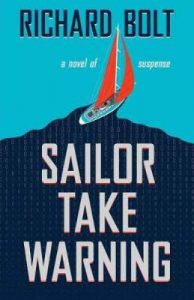Here is where I’ll be talking about me, my new book Sailor Take Warning, and how I got to writing it.
 It was after I’d published a non-fiction, work-related book on a project I was heading up at the MIT Media Lab. The title of the book was The Human Interface, to be published by Duxbury Press. I’d gotten the writing bug. After finishing The Human Interface, I found myself with a lot of momentum, and itching to go onto another writing project.
It was after I’d published a non-fiction, work-related book on a project I was heading up at the MIT Media Lab. The title of the book was The Human Interface, to be published by Duxbury Press. I’d gotten the writing bug. After finishing The Human Interface, I found myself with a lot of momentum, and itching to go onto another writing project.
It was too soon to write another book centered on human-computer interaction, though I’d begun to assemble a massive pile of notes for a follow-on. Then it occurred to me: what about fiction? Many researchers in the computer world accused the people at the MIT Media Lab of dealing in technological fiction in any case, given the futuristic work that was being researched there, so why not?
I began compile notes on story chapters. Classic advice to would-be writers is to write about what you know. OK. My novel-in-the-making would be set at a fictional MIT lab. My protagonist would be an associate professor named Bill Rundle, who was heading up his own team of graduate research assistants.
How old should Rundle be? Old enough to hold a professorial post, yet young enough to be running after and grappling with a baddie if need be. I’d make him late thirties, early forties at most.
What was to be the “inciting incident” — something that happens up front that sets things rolling?
Discover a body? How about one of the research assistants? They’re handy, and would immediately involve Rundle. It’ll be Justin Marsh, one of Rundle’s prized students. And I’d have Rundle discover the body himself, oh, as he’s taking an early morning exercise walk along the Charles River by the MIT campus.
Could the death have been an accident? No, there’s something suspicious about it; the body bears marks of violence. Rundle in short order gets a posthumous email from Marsh’s computer: a voluminous file of binary code which could well be sheer gibberish or something of great value for which Marsh may have been killed…
One idea led to another. Writing the story became hard work, yet great fun, events unfolding and characters becoming increasingly alive.
The story wasn’t completed until I’d retired from the Media Lab. I’d made notes of additions, subtractions, and revisions, and getting boosts from enrolling in adult education mystery writing classes. Plus, forming a writing group — more on that to come on a post on this site.
Then, the story done, came the push to get it published. In response to my early inquiries one of the very top New York agents said she’d take it on. Wow! Then, out of the blue, she changed her mind. Ouch! Another agent, more locally based, took it on for a year and sent it out to over a dozen editors, all with no bites. Then, over 60 inquiries over the months, years… Finally, success! Encircle Publications, took it on, with the result:
(My book can be ordered at the Encircle web site.)
Being published is a great thrill. Yes, writing is its own reward, but it’s a great vindication to see one’s work out there in print.
What’s next? More writing, for sure.
Sailor Take Warning is a “stand alone.” Currently, I’m working on a series, the protagonist of which is a Boston-based property lawyer named Charles River. (Pun intended!) River, having worked with an indemnity company, is striking out on his own, helping clients recover disputed property. The first of these Charles River mysteries, titled Russian Blood, opens with an elderly Russian prince hiring River to recover estates for his granddaughter that had been abandoned in Russia after the 1917 Bolshevik Revolution.
But more on that at another time. For now, the focus is on Sailor.
